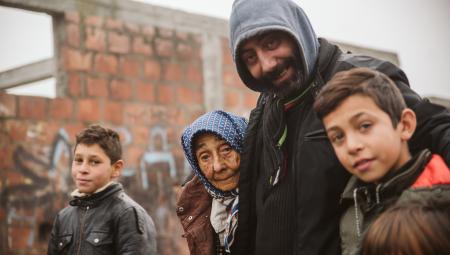Summary
Dementia is a deteriorating condition where the person loses one ability after another. Caring for someone with dementia puts enormous strain on the family carer’s energies, resilience, physical and mental well-being and family relationships. The carer’s ability to stay emotionally and physically well is crucial for both the carer and the person with dementia. Preparing for such change is important and can be supported. Recently, face-to-face support with online training for carers, the ‘Partner in Balance’ (PiB) programme, was developed in the Netherlands. This was positively evaluated, adding flexible access, content and usability to traditional support including leaflets, individual and groups. We will adapt the PiB programme to develop dedicated support for UK carers, combining face-to-face sessions, a web-based home programme and support from a coach.
PiB will be ‘co-developed’ with family carers and healthcare professionals, to agree what to include in the PiBUK programme, to make it work in real life and help people use it. We will produce additional film clips and other materials (as needed), to better reflect the UK population and care situations. We will test and adapt PiBUK to be acceptable and practical for carers to use, in a feasibility study in seven sites. Then test the effects of PiBUK, in a randomised controlled trial in 26 sites, on carers’ sense of being able to care well, their mood and quality of life.
We will collect and compare these measures at baseline, and then after 6 and 12 months.
We have worked with people with dementia and their families (one carer is a co-applicant) to develop the topic in focus groups and interviews. We carried out a national survey of 400 carers from Together In Dementia Everyday (TIDE) to find out how important the topic was to them and how to shape the study. This led to a design codeveloping PiBUK to ensure it is relevant, accessible and engaging and to choose measures of outcomes which carers see as important. A steering group will have two carers supported to oversee the research with continued support from carers in TIDE and the Alzheimer's Society.
Project Aims
- Actively involve carers and clinicians/service providers to co-produce PiBUK focusing on acceptability and usability in the UK cultural context
- Use co-production to inform implementation strategies and integrate PiBUK into existing health and social care pathways
- To understand the dynamics of professional and caregiver experiences of PiB, their effects on trial outcomes, and potential effects on implementation in real-world service settings.’
- Undertake a feasibility trial testing implementation outcome measures deliverability and carer uptake of PiBUK
- Undertake a randomised controlled trial to test the effectiveness of PiBUK in reducing carer stress and burden
Project Activities
- In CARECOACH we will use co-production with carers in the eastern region to adapt the intervention for the UK context. We will produce new videos and static content.
- We will assess and adjust as a result of feedback any usability issues.
- We will then undertake feasibility, pilot and full scale national evaluation across 26 sites.
- We will work with Dementia UK, Alzheimer’s society and TIDE to develop materials from study findings to support carers. PiBUK will have a website with free resources. We will share study results via local and national academic links, public press, and social media channels. To help PiBUK have wider impact we will run policy workshops with service commissioners and local provider groups. We will publish scientific findings in open-access academic and professional journals and scientific and public conferences, including Alzheimer’s Society and TIDE events.
- The intervention development (WP1) is being presented at the British Society of Geriatrics at the beginning of July 23 and the associated paper is under development.
Anticipated outputs
(i) The development of an adapted PiB UK intervention that is accessible to carers of people with dementia and that can be delivered by existing staff following training
(ii) Establishment of definitive estimates of the clinical and cost effectiveness of PiB UK as an intervention for carers within the NHS.
(iii) An expert-designed, acceptable and efficient training programme for training staff in PiB UK.
If the evaluation shows that PiB UK is more effective than usual care alone for carers of people with dementia, either clinically and/or in terms of cost, we will apply for training and implementation funding so that the intervention could be fully disseminated and rolled out in clinical practice through memory services, clinical psychology, and IAPT services within the NHS.
By 2025 a new carer support intervention ready for deployment across the NHS.
Next Steps
We envisage testing the intervention in Peterborough and Fenland, Great Yarmouth and Waveney, Stevenage, Thurrock and also engaging with carers from these areas.
Who is involved?
Project PI - Prof Fox/Dr Cross, Chris.Fox@uea.ac.uk
Prof Oyebode Bradford
Dr Teague; Dr West, Dr Ridel, Dr Lussignea Norfolk and Suffolk NHS Foundation Trust
Prof Shepstone, Dr Turner, Dr Penhale, Dr Gracey UEA
Prof Poland UEA
Prof May London School of Hygiene and Tropical Medicine
Dr Harrison Dening -Dementia UK
Prof Orrell Nottingham
Prof De Vugt Maastricht Netherlands
Contact us
Prof Fox, Chris.Fox@uea.ac.uk





